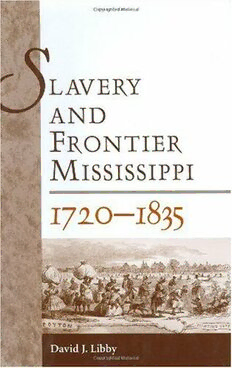Download Slavery and Frontier Mississippi, 1720-1835 PDF Free - Full Version
Download Slavery and Frontier Mississippi, 1720-1835 by David J. Libby in PDF format completely FREE. No registration required, no payment needed. Get instant access to this valuable resource on PDFdrive.to!
About Slavery and Frontier Mississippi, 1720-1835
In the popular imagination the picture of slavery, frozen in time, is one of huge cotton plantations and opulent mansions. However, in over a hundred years of history detailed in this book, the hard reality of slavery in Mississippi's antebellum world is strikingly different from the one of popular myth. It shows that Mississippi's past was never frozen, but always fluid. It shows too that slavery took a number of shapes before its form in the late antebellum mold became crystalized for popular culture. The colonial French introduced African slaves into this borderlands region situated on the periphery of French, Spanish, and English empires. In this frontier, planter society made unsuccessful attempts to produce tobacco, lumber, and indigo. Slavery outlasted each failed harvest. Through each era plantation culture rode the back of a system far removed from the romantic stereotype. Almost simultaneously as Mississippi became a United States territory in the 1790s, cotton became the cash crop. The booming King Cotton economy changed Mississippi and adapted the slave system that was its foundation. Some Mississippi slaves resisted this grim oppression and rebelled by flight, work slowdowns, arson, and conspiracies. In 1835 a slave conspiracy in Madison County provoked such draconian response among local slave holders that planters throughout the state redoubled the iron locks on the system. Race relations in the state remained radicalized for many generations to follow. Beginning with the arrival of the first African slaves in the colony and extending over 115 years, this book is the first such history since Charles Sydnor's Slavery in Mississippi (1933). David J. Libby, an independent scholar, lives in San Antonio, Texas. His work has been published in CrossRoads: A Journal of Southern Culture.
Detailed Information
| Author: | David J. Libby |
|---|---|
| Publication Year: | 2004 |
| ISBN: | 9781423732099 |
| Pages: | 182 |
| Language: | English |
| File Size: | 0.734 |
| Format: | |
| Price: | FREE |
Safe & Secure Download - No registration required
Why Choose PDFdrive for Your Free Slavery and Frontier Mississippi, 1720-1835 Download?
- 100% Free: No hidden fees or subscriptions required for one book every day.
- No Registration: Immediate access is available without creating accounts for one book every day.
- Safe and Secure: Clean downloads without malware or viruses
- Multiple Formats: PDF, MOBI, Mpub,... optimized for all devices
- Educational Resource: Supporting knowledge sharing and learning
Frequently Asked Questions
Is it really free to download Slavery and Frontier Mississippi, 1720-1835 PDF?
Yes, on https://PDFdrive.to you can download Slavery and Frontier Mississippi, 1720-1835 by David J. Libby completely free. We don't require any payment, subscription, or registration to access this PDF file. For 3 books every day.
How can I read Slavery and Frontier Mississippi, 1720-1835 on my mobile device?
After downloading Slavery and Frontier Mississippi, 1720-1835 PDF, you can open it with any PDF reader app on your phone or tablet. We recommend using Adobe Acrobat Reader, Apple Books, or Google Play Books for the best reading experience.
Is this the full version of Slavery and Frontier Mississippi, 1720-1835?
Yes, this is the complete PDF version of Slavery and Frontier Mississippi, 1720-1835 by David J. Libby. You will be able to read the entire content as in the printed version without missing any pages.
Is it legal to download Slavery and Frontier Mississippi, 1720-1835 PDF for free?
https://PDFdrive.to provides links to free educational resources available online. We do not store any files on our servers. Please be aware of copyright laws in your country before downloading.
The materials shared are intended for research, educational, and personal use in accordance with fair use principles.

